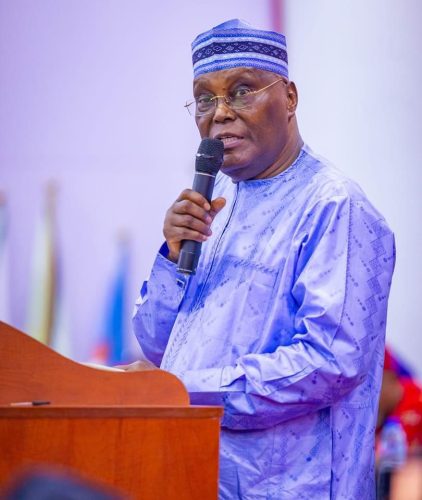Education
Atiku Knocks Out Tinubu’s Age Limit for Tertiary Institutions, Says Policy is Stone-Aged
Former Vice President Alhaji Atiku Abubakar has stated that the educational policy which limits age for tertiary institutions of the President Bola Tinubu-led administration belongs to the Stone Age.

Former Vice President Alhaji Atiku Abubakar has stated that the educational policy which limits age for tertiary institutions of the President Bola Tinubu-led administration belongs to the Stone Age.
The Education Minister, Professor Tahir Mamman, stated that the minimum age for admission into higher institutions is 16 or 18. He argued that this policy is not newly initiated by the present administration and explained that the policy will exclude students who are below 18 this year.
“It is 18. (years) What we did at the meeting that we had with JAMB was to allow underage candidates this year and for it to serve as a kind of notice for parents.”
“JAMB will admit students who are below that age, but from next year, JAMB is going to insist that anybody applying to go to university in Nigeria meets the required age which is 18.”
“This is a policy that has been there for a long time. If you compute the number of years pupils and learners are supposed to be in school, the number you will end up with is 17 and a half,” he said.
“In any case, NECO and WAEC, henceforth, will not be allowing underage children to write their examinations.
“In other words, if somebody has not spent the requisite number of years in that particular level of study, WAEC and NECO will not allow them to write the examination.”
The former Presidential candidate of the Peoples Democratic Party (PDP) in the 2023 General election argued that Nigerians should be guaranteed intellectual freedom. He reminded the present administration that Nigeria has numerous issues bedeviling it, and suggested that focusing on an anti-scholarship policy will further drain the struggling education system.

Atiku stated on Wednesday that it is embarrassing that the federal government, which identifies and grants scholarships to gifted children regardless of their ages, has no plans to make provisions for these children in the new policy.
The statement titled: “Tinubu’s policy on age limit for tertiary education admission belongs in the Stone Ages” reads;
“The recent policy of the Federal Ministry of Education pegging age limits for entry to tertiary institutions is an absurdity and a disincentive to scholarship.
The policy runs foul of the notion of delineation of responsibilities in a federal system of government such as we are pratising, and gives a graphic impression of how the Tinubu government behaves like a lost sailor on a high sea. Otherwise, how is such anti-scholarship regulation the next logical step in the myriad of issues besetting our educational system?
To be clear, the Nigerian constitution puts education in the concurrent list of schedules, in which the sub-national government enjoys more roles above the federal government.
Therefore, it is extra-constitutional for the federal government to legislate on education in a manner similar to a decree.
The best global standard for such regulation is to allow the sub-national governments to make respective laws or rules on education.
It is discouraging that even while announcing this obnoxious policy, the government inadvertently said it had no plan to cater for specially gifted pupils. That statement is an embarrassment to the body of intellectuals in the country because it portrays Nigeria as a country where gifted students are not appreciated.
The irony here is that should the federal government play any role in education, it is to set up mechanisms that will identify and grant scholarships to gifted students not minding their ages before applying for admission into tertiary institutions.
This controversial policy belongs in the Stone Ages and should be roundly condemned by everyone who believes in intellectual freedom and accessibility. -AA”
For publication of your news content, articles, videos or any other news worthy materials, please send to newsleverage1@gmail.com. For more enquiry, please call +234-706-806-4347 or whatsapp +234-706-806-4347. To place an advert, please call 07068064347.
-

 METRO2 weeks ago
METRO2 weeks agoDebtors Rejoice Over Death of Popular Money Lender, ‘Old Warri’
-

 CRIME4 weeks ago
CRIME4 weeks agoPolice Crack Down on IPOB/ESN, Kidnapping Gangs, Arrest Over 2,700 Suspects
-

 NATIONAL NEWS1 week ago
NATIONAL NEWS1 week agoAdeyanju Reveals Who Funds Atiku’s Presidential Bid
-

 Abia State News3 weeks ago
Abia State News3 weeks agoEze Eberechukwu Oji Establishes Four Development Committees
-

 CRIME3 weeks ago
CRIME3 weeks agoPregnant Nurse Allegedly Murdered for Ritual in Anambra





